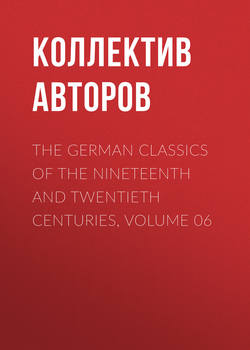The German Classics of the Nineteenth and Twentieth Centuries, Volume 06

Реклама. ООО «ЛитРес», ИНН: 7719571260.
Отрывок из книги
"Nothing is permanent but change, nothing constant but death. Every pulsation of the heart inflicts a wound, and life would be an endless bleeding were it not for Poetry. She secures to us what Nature would deny—a golden age without rust, a spring which never fades, cloudless prosperity and eternal youth."—BÖRNE.
The inhabitants of Göttingen are generally divided into Students, Professors, Philistines, and Cattle, the points of difference between these castes being by no means strictly defined. The "Cattle" class is the most important. I might be accused of prolixity should I here enumerate the names of all the students and of all the regular and irregular professors; besides, I do not just at present distinctly remember the appellations of all the former gentlemen; while among the professors are many who as yet have no name at all. The number of the Göttingen "Philistines" must be as numerous as the sands (or, more correctly speaking, as the mud) of the seashore; indeed, when I beheld them of a morning, with their dirty faces and clean bills, planted before the gate of the collegiate court of justice, I wondered greatly that such an innumerable pack of rascals should ever have been created by the Almighty.
.....
When a boy I thought of naught save tales of magic and wonder, and every fair lady who had ostrich feathers on her head I regarded as an elfin queen. If I observed that the train of her dress was wet I believed at once that she must be a water-fairy. Now I know better, having learned from natural history that those symbolical feathers are found on the most stupid of birds, and that the train of a lady's dress may become wet in a very natural way. But if I had, with those boyish eyes, seen the aforesaid young lady in the aforesaid position on the Brocken, I would most assuredly have thought—"that is the fairy of the mountain, and she has just uttered the charm which has caused every thing down there to appear so wonderful." Yes, at the first glance from the Brocken everything appears in a high degree marvelous. New impressions throng in on every side, and these, varied and often contradictory, unite in our soul in an as yet undefined uncomprehended sensation. If we succeed in grasping the sensation in its conception we shall comprehend the character of the mountain. This character is entirely German as regards not only its advantages but also its defects. The Brocken is a German. With German thoroughness he points out to us—sharply and accurately defined as in a panorama—the hundreds of cities, towns, and villages which are principally situated to the north, and all the mountains, forests, rivers, and plains which extend endlessly in all directions. But for this very reason everything appears like a sharply designed and perfectly colored map, and nowhere is the eye gratified by really beautiful landscapes—just as we German compilers, owing to the honorable exactness with which we attempt to give all and everything, never appear to think of giving the details in a beautiful manner.
The mountain, in consequence, has a certain calm, German, intelligent, tolerant character, simply because he can see things so distant yet so distinctly. And when such a mountain opens his giant eyes, it may be that he sees somewhat more than we dwarfs, who with our weak eyes climb over him. Many indeed assert that the Blocksberg is very Philistian, and Claudius once sang "The Blocksberg is the lengthy Sir Philistine;" but that was an error. On account of his bald head, which he occasionally covers with a cloud-cap, the Blocksberg has indeed a somewhat Philistian aspect, but this with him, as with many other great Germans, is the result of pure irony; for it is notorious that he has his wild student and fantastic periods, as, for instance, on the first night of May. Then he casts his cloud-cap uproariously and merrily into the air, and becomes, like the rest of us, romantic mad, in real German fashion.
.....